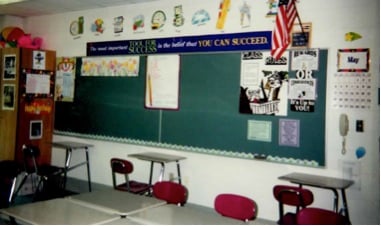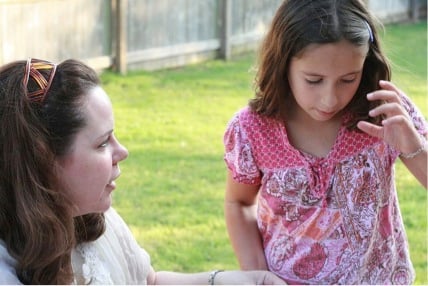“Look, she’s still playing school,” my mother told my father the first time they visited the seventh grade classroom of my first teaching job. As a little girl, I played school nearly every day, even sending friends home with homework and decorating the door of my room with holiday themes for each month. I taught elementary and middle school for nine years before I stayed home after the birth of my oldest child. As part of my training in college, I was trained to analyze each lesson after it was taught and figure out what worked and what did not work. It became a habit that I maintained throughout my teaching years. I was a successful teacher, with an organized classroom and I could handle some of the toughest students, but I was barely keeping my head afloat as a mother. I finally went back to school for all the lessons my teaching years could offer. Most often, when I see my children behaving badly or having bad attitudes-- much to my annoyance--it can be traced back to my own issues.
A popular education book is The First Days of School by teacher, Harry Wong. It was a gift when I graduated and one to which I referred throughout my teaching career. Its advice has value for mothers, also. The entire book focuses on preparing for the first day of school with an emphasis on the Keep It Simple Stupid (KISS) philosophy. Wong tells teachers to let go of their expectations of imagined perfection so they can focus on the real task at hand: teaching children so they develop mastery of subject matter. One example of his advice is just cover the bulletin boards with fabric and border, so students’ work can be displayed instead of spending hours drawing, cutting and arranging a work of art on your wall. I have to return to this idea often to reduce stress on my children and myself. Sometimes we stress our kids and ourselves with our well-meaning efforts. Stressed people don’t always treat each other well. A family rosary can accomplish as much or more for my children’s spiritual formation than a craft or elaborate activity. It’s the end result that I’m looking for which has to be my focus, not what the activity might look like on my blog.
In my classroom, I had a system and routine for everything. During the first week of school, I trained the students in those routines, so we didn’t have to spend time on them later in the year. Even middle schoolers practiced routines for things like sharpening a pencil or leaving the room for the restroom. Seriously. It made for an organized classroom, without chaos and with more time for learning. A lack of simple systems and routines can cause problems in a classroom or a home. Kids’ rooms get messy when they don’t have easy-to-use storage for toys and clothing. Sadly, it took me a while to figure that out! Laundry piles up when I don’t have a system for hanging and folding or a routine for children to put away their own clothing. My messy kitchen in the evening was caused by not having a routine for everyone to help with the clean-up. As a mom, I had to do what I did in the classroom. I sat down and thought about all the normal daily activities and tasks in our home and figured out how I wanted them to look. Then, I had to establish the routines and systems necessary for that to happen, while allowing for lots of practice, tweaks, and mistakes along the way. This is a work-in-progress for me, as a drop-in visit would quickly reveal.
In my classroom, a lack of preparation or participation on my part carried over into my students’ learning and behavior. If I didn’t set up the materials I needed before class, I was left to search and waste time while students got restless. That’s when misbehaviors occurred. A neat (not perfect) classroom made a huge difference in my attitude in the mornings. I was in a better mood and had more time to focus on students rather than tasks. A neat (not company-perfect) kitchen and living room make a huge difference in my attitude now. If I have to clean the kitchen first thing in the morning, I feel defeated already and the resulting grouchy mood affects the way I interact with my children. It also affects the way I spend my time. Also, when I find I am distracted for too long by something like writing a blog post or watching news coverage, my children find mischievous ways to busy themselves!
Sickness, hunger, thirst and a lack of sleep have a tremendous impact on children. I understood this to a limited degree in my classroom. I allowed students to bring a mid-morning snack from home and they could keep a water bottle during class. I was a little shocked as a parent when I realized how a late meal could affect my children. A late bedtime makes for a grouchy person the next morning, whether it be a parent or child. I did not really understand how sickness affected children until I became a mother. The disappearance of symptoms didn’t mean the child was all better. Fatigue and lethargy could hang on for days afterward, so a child might seem irritable or to just have a bad attitude when his body was still trying to catch up after the illness. It was eye-opening the great effect that just a fever could have, as my children were exhausted from their bodies fighting it for even as little time as twenty-four hours. I learned to consider these things as I addressed their behaviors with understanding and empathy. There are some related moments in the classroom for which I’d like a do-over!
Then, there’s another little bit of wisdom that a supervising sixth grade teacher shared with me. I had just taught a lesson and I wasn’t pleased because it wasn’t perfect. I didn’t think the students participated well, nor did I think they learned that which I was teaching them. I began a litany of all the things I had done wrong. The teacher just looked at me and said, “That makes me sad to hear you say that because it was a good lesson.” He then continued to share what I have kept in mind all these years, in classrooms and at home.
“Terri, sometimes it’s nothing you did. Sometimes, kids just have bad days, just like we do.” I have to keep in mind, after I’ve analyzed for root causes, sometimes it’s just a bad day for me or for my children. Deep breath, reduce the damage as much as possible, and move on. Our children are not simply the sum of their actions or behaviors. They are complicated human beings and there is tremendous beauty in our being given a chance to start anew with them at each dawn.
I can’t solve everything that goes wrong in our family. I can plan and prepare to prevent or reduce some things. Still, it all centers on Christ, who has to be the real center of our home. I have to turn to Him for eyes to see my home and family and to Him for strength and grace to take reasonable measures as a wife and mother. Then, it is to Him I have to offer up my marriage, my children, my home and my worries, knowing that ultimately, it is ALL in His capable hands and not in my simple ones.
Copyright 2013 Terri Duhon
About the Author

Guest
We welcome guest contributors who graciously volunteer their writing for our readers. Please support our guest writers by visiting their sites, purchasing their work, and leaving comments to thank them for sharing their gifts here on CatholicMom.com. To inquire about serving as a guest contributor, contact editor@CatholicMom.com.




.png?width=1806&height=731&name=CatholicMom_hcfm_logo1_pos_871c_2728c%20(002).png)
Comments